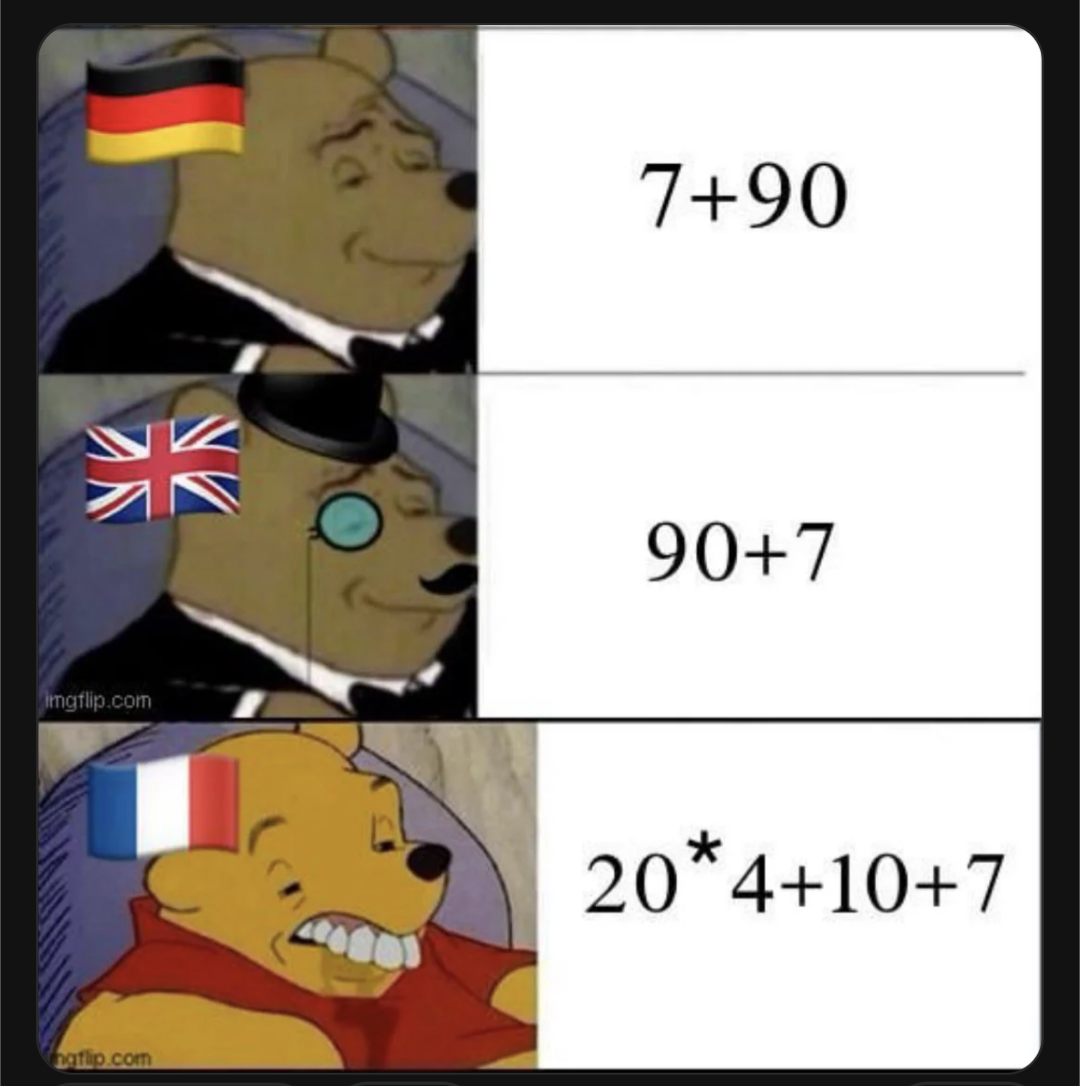Funny: Home of the Haha
Welcome to /c/funny, a place for all your humorous and amusing content.
Looking for mods! Send an application to Stamets!
Our Rules:
-
Keep it civil. We're all people here. Be respectful to one another.
-
No sexism, racism, homophobia, transphobia or any other flavor of bigotry. I should not need to explain this one.
-
Try not to repost anything posted within the past month. Beyond that, go for it. Not everyone is on every site all the time.
Other Communities:
-
/c/TenForward@lemmy.world - Star Trek chat, memes and shitposts
-
/c/Memes@lemmy.world - General memes
Katre-van-deez-nuts
Ha! Je les ai eu!
Context:
German:
- "siebenundneunzig"
- = "sevenandninety"
English:
- = "ninety-seven"
French:
- "quatre-vingt-dix-sept"
- = "four-twenty-ten-seven"
It's shit like that why I wonder people just don't update their languages, remove useless letters, nonsensical loan words exonyms, etc.
LOL, this kind of shit is what happens when people do try to police their language:
https://en.wikipedia.org/wiki/Acad%C3%A9mie_Fran%C3%A7aise
https://en.wikipedia.org/wiki/Office_qu%C3%A9b%C3%A9cois_de_la_langue_fran%C3%A7aise
... A dictionary? We already have those in English lol.
Oxford University Press doesn't have governmental enforcement powers the way the OQLF does.
German did. And it worked. One of the reasons is probably that written German is uniform everywhere. I imagine language reformes are harder and less effective when dialects are still big.
Like many things in life, languages aren't necessary logical but I'm looking forward to your efforts to finally get everyone into Esperanto!
We all do constantly with each word spoken. Language is updated without rest forever.
French Belgians 90 + 7
Same for Swiss French except for Geneva (of course).
Not to defend the French but the more correct representation would be 4 * 20 + 10 + 7.
Also if you take this meme to the extreme it would be best to just say “97” which requires a unique word for every number instead of a system to construct them. So I guess there is a balance to be struck in number composition.
also "ninety" is literally just a shortening of "nine ten", it's not like the french pronounce the whole thing either, i'd wager it usually comes out more like "katvandisett" which isn't much worse than "ninetyseven"
Actually we do prononce it entirely, at most dropping the first syllable
Can't let this go by without posting this classic:
"We aren't all Eric Einstein!" 😂
80 (quatre-vingt) comes from the base 20 system. That's a vestige from pre indo-European languages (specifically the Gauls) that ended up influencing France.
Interestingly (if I'm not mistaken), in Switzerland they actually say "huitante" and in Belgium they say "octante".
In Wallonia ( french belgium ) you're also likely to hear "nonante" for 90 IIRC
The Gauls were Celtic, which is Indo-European. Maybe you meant "Pre-Romance"?
And the French get offended if you use the wrong word. I went to a shop there and asked if something was ninety (there is a word for that). The shopkeeper gives me a scathing look and says with emphasis it's four twenty ten.
'Nonante' is used in the French-speaking part of Belgium, but it's generally frowned upon in France.
frowned upon
as in "you just wiped your ass with my language, my country and the history of my ancestors" it seems
They kind of stare at you as if you just farted in the most obscene way possible.
Or they passive-aggressively make you repeat what you said until you say it 'right'.
Or they reply in a kind of exaggerated broken English.
Not the ever so polite French!
I spent a lot of time in the country when I worked for a French owned company.
It's a beautiful country, too bad about the epidemic of sticks in their asses. I am so glad it hasn't spread to their neighbors.
Japanese: 9*10+7
Growing up bilingual in German and English, can I just say german's "7 + 90" is pretty dumb too.
397 is 300 + 7 + 90: 100s 1s 10s. For bigger numbers you're doing it repeatedly.
In German for every set you're saying the digits and tens in the wrong order. You get used to it, but only if you grow up in Germany (I didn't), else it forever does you head in reading numbers.
Dutch also has that problem, it causes so many errors.
Old English used to have the same problem ( https://en.m.wikibooks.org/wiki/Old_English/Numbers ), but at one point they must have seen the light, probably some time after they were conquered by the french in 1066. I do remember reading a Charles Dickens story where a person said a number with tens and ones in the reverse order and I wonder when it finally died out completely in English (if it ever did, maybe it's still in use in some dialects).
Edit: thirteen, fourteen, ... There's still commonly used remnants of this reverse order in English, we'll never get rid of this insanity :)
🚫🤢fr*nch🤮🚫
XCVII
In old French, 127 was 6*20+7.
It's the fact of using base 20.
Tbf I think in English it's more like... 9*10+7
I'm not a historian or linguist so there is a good chance I'm wrong, but I just kind of always assumed that "ninety" meant "nine-tens" - that the "ty" was an earlier form of, or was corrupted from, "tens".
